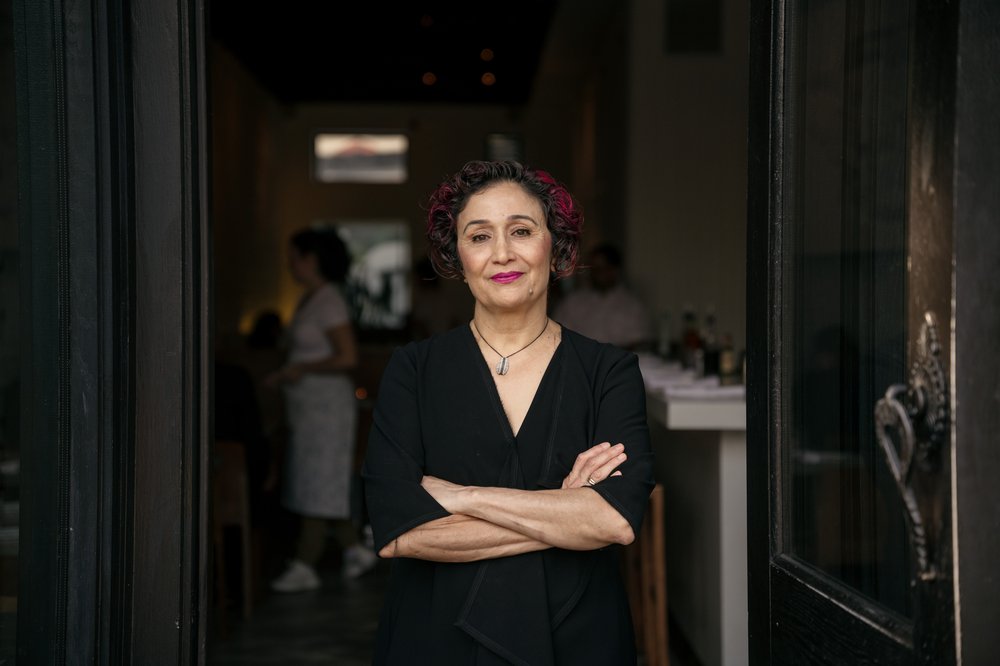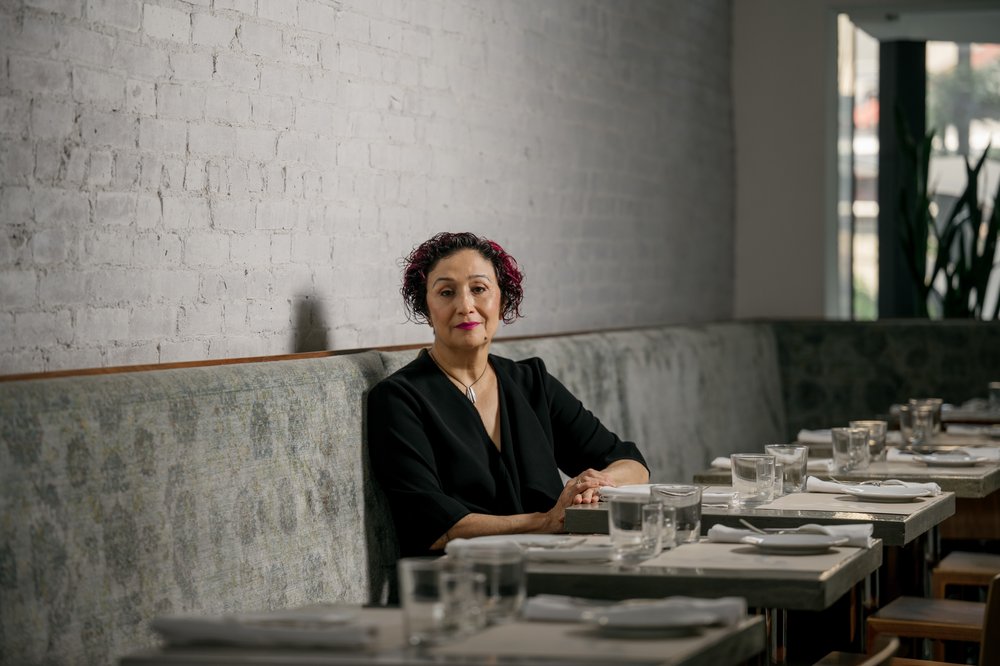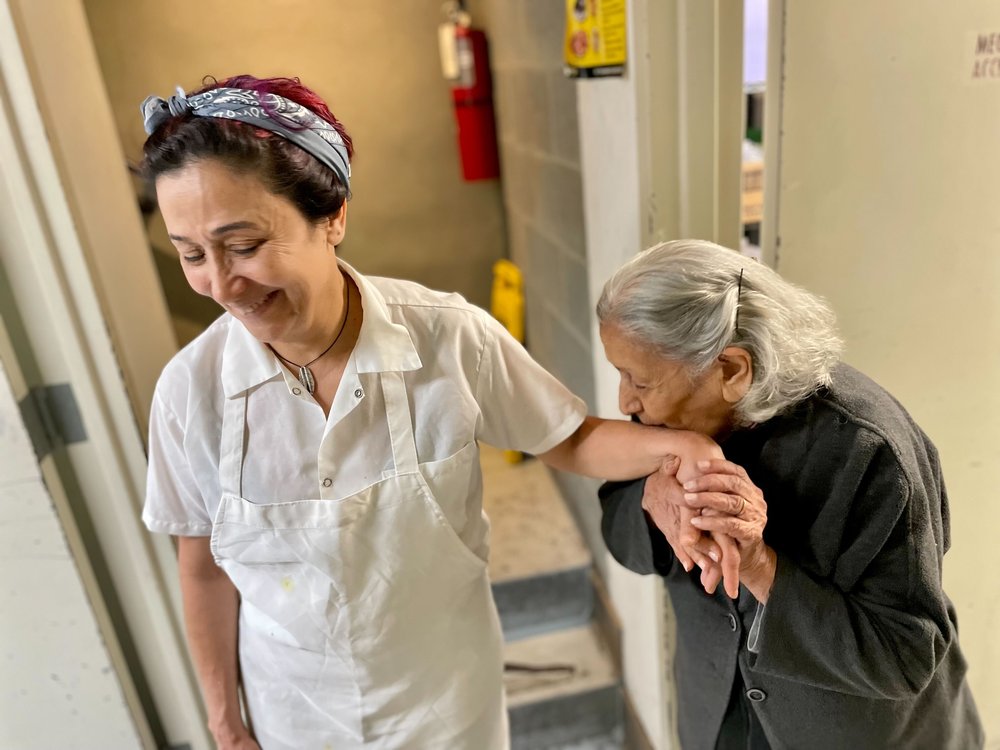In just 5 years, Sofreh’s Nasim Alikhani has topped NYC’s food scene. She says it took a lifetime.
June 5, 2023, 7 a.m.
Chef Nasim Alikhani has cooked for the Met Gala, the White House, and now she’s off to the James Beard Awards, where she’s nominated for Best Chef in New York.

Sofreh is one of the hottest restaurants in Brooklyn, and it only took Nasim Alikhani 30 years to open it.
“I am bringing my entire life into this,” she said on a recent Tuesday, sipping water out of a to-go container in the shade of Sofreh’s back patio.
Since Sofreh debuted in 2018, it’s been called “NYC’s most exciting Persian restaurant.” Alikhani was a guest chef for the White House in March, she was invited to be one of 10 chefs at the Met Gala in 2021, and she has a cookbook out later this month.
And on Monday night she’s up for a James Beard Foundation Award as best chef in New York — one of the industry’s top honors.

Sofreh is so buzzy that even its bathroom, papered in vintage Iranian film posters, has received breathless media coverage, once featured in an article about “thrilling” bathrooms.
Alikhani will be accompanied by her daughter, who manages her Instagram and marketing, and her husband, who co-owns the restaurant, at the awards ceremony in Chicago. She is one of five people nominated for best chef in New York, alongside talents like Amanda Cohen of Dirt Candy and Mary Attea of the Musket Room.
“The blessing keeps coming,” said Alikhani. “It's one thing to be a good cook and have your restaurant filled, but it's also another thing that the highest standard of the industry comes and notices you.”
In a city where you can find just about every kind of cuisine, what makes Sofreh the hot new thing is actually generations old.
And for its head chef, it’s the culmination of a journey that began with fleeing her native Iran after the revolution, to rebuilding a life and starting a family in the U.S., to climbing to the top of an industry that is nowhere more competitive than in New York City.
Alikhani is putting a modern spin on recipes she learned from her grandmothers and her mother, a school principal who made home-cooked meals every day.
She’s serving up dishes like lamb shank with dill and lime butter; fluffy sangak bread, which looks like pita with a richer flavor; and tahdig, a crispy rice that Sofreh fans warn to order early because the place is known for running out.
Like any hip Brooklyn restaurant, Sofreh has a curated and on-brand cocktail program, including a saffron vesper, which is a combination of Tito’s vodka, gin, Lillet, saffron and rosewater tincture; and the Isfahan gimlet, which includes gin, whey, cardamom and firewater bitters. It also has beers on tap, as well as sparkly yogurt drinks, which are popular in Iran.
And it’s all served in a modern-looking space with a white brick wall, wood beams, ash gray tabletops and simple wood chairs.
“As far as I know, there weren't any other places in New York that were cool and contemporary and felt really of the moment, that were Persian restaurants,” said Louisa Shafia, author of The New Persian Kitchen cookbook. With Sofreh, she said, “You feel like you're going into, like any great hip restaurant in Brooklyn, versus something that's like a hole in the wall.”
“Iranian food is still really unknown to a lot of people here, and her food just makes it easily translatable,” said Shafia. “She uses all of our regular ingredients like rose petals and saffron and pistachios that are naturally gorgeous, and just draws you in with the beauty of the cuisine.”
Alikhani has her own take on her success, though she says some of it was due to luck and timing.
“I brought home cooking, truly home cooking, the way any good cook in Iran would offer, like a variety of food to her guests in her house,” said Alikhani. “I do that in a restaurant setting with the same level of care.”
Amir Alikhani, her brother, also helps out at the restaurant several days a week.
"I wouldn't call this just a restaurant," he said. "It's sort of a sanctuary in a way. It's an extension of our homes. This is part of our culture. Hospitality is what we are known for and we wanted to replicate that in a bigger, commercial sense."

Later that afternoon, Alikhani’s mother, Giti Esfahani, visiting from Iran, stopped by the kitchen, quietly watching the team work. She drank a homemade strawberry lemonade with the staff.
When asked how she felt about being the inspiration for Alikhani’s success, Esfahani said her daughter has always been smart and hardworking.
Alikhani, who was translating the conversation, smiled and lightly rolled her eyes.
“In Iran, people are humble,” she said. “You never accept the compliment, you pass it on to someone else,” she said, referring to the rules of Iranian etiquette, known as taarof.
“In my case, I truly don't believe in taarof,” said Alikhani. “I learned from her and all the women in my lineage.”
Esfahani reached for her daughter’s hands.
“These hands worked from the time she was young,” she said, cradling her daughter’s left hand. Then Esfahani showed her own. “We are both working hands.”
That, they agree upon: Alikhani describes herself as a “workaholic.”
Alikhani, 64, was born in Isfahan, Iran, and raised in what she described as an upper-middle class family. She studied law with the intention of becoming a judge, but in her early 20s, as Ayatollah Ruhollah Khomeini led a revolution to oust the Shah and establish the Islamic Republic of Iran, she watched her rights evaporate. Women were barred from participating in much of government, putting an end to young Alikhani’s hopes of becoming a judge.
“I didn't want to leave the Iran I knew,” she said. “But the Iran I knew, it didn't exist anymore.”
By the time she arrived in New York City in 1983, she had lost interest in practicing law.
Alikhani matter-of-factly ticked off events from her youth that a 20-something today might call trauma: “Probably a lot of depression, revolution, changing homes, didn't want to leave Iran, a lot of executions of classmates,” she said. “It was just a really hard time for my generation back then, and then [the Iran-Iraq] war on top of it, eight years of war. By the time I got here, I didn't even know what I was gonna do.”
What she did was a little of everything. She nannied for an Iranian family in Queens, delighting them – and herself – with her cooking and earning extra money for it. She studied sociology at Hunter. She ran and sold a copy shop. She became pregnant with twins, and when they got older, she took pride in serving the best food at sleepovers, according to their friends. She gave her time and talents to philanthropy, catering events for causes she cared about.
“I was feeding hundreds of people who had no idea,” she said. “Now Persian food is hot and is interesting and it's everywhere. But like 15, 20 years ago, many people had never had Persian food. They had no idea. And I could see them devouring the food.”
“I was always working towards this ... but I didn't know it was gonna be this.”
Nasim Alikhani
Looking back, she says all that effort was “marketing research” for what would eventually become Sofreh.
Five years ago, with her children grown, Alikhani finally opened Sofreh in a Prospect Heights townhouse that she owns with her husband.
Despite her late start in a youth-driven business, Alikhani said she doesn’t see herself as a late bloomer.
“I was always working towards this,” she said with a laugh. “But I didn't know it was gonna be this.”
Running a restaurant in her 60s has been a blessing, she said, because she’s had time to build a life, and raise her kids. Now, she said she can care for Sofreh like it’s her “newborn.”
“I'm very fortunate to do this now at this stage of my life and not regret or not think that I'm missing anything,” she said.
But why start putting in 12 hour days at a time when peers might be planning retirement? She and her husband don’t need the money, or the stress of running a restaurant.
Alikhani said she couldn’t bear the thought of looking “at the person in the mirror” and knowing “you could have done it but you didn’t.” That, she said, was scarier than failing.
Still, the scale of her success has been surprising, even to Alikhani.
In March, while she was working a dinner shift, her husband informed her that she had an email from the White House.
“I said, ‘No, it's a scam. Don't open it,” she said. “What White House has to do with me?”
But later, when she checked email in her closet-sized office at the restaurant, she discovered she was being asked to guest chef the White House’s Persian New Year celebration.
“Oh my God, it was amazing,” she said, adding that the White House kitchen “was just such an incredible operation, an incredible kitchen.”
On Tuesday, Alikhani floated around the minimalist dining room, greeting guests, running grilled carrots and feta salad from the kitchen.
The vibe was low-key party, helped by the “Persian Funk and Psych” Spotify playlist, with hits from the ‘60s and ‘70s — Alikhani’s teenage years — by Marjan and Googoosh.
Among the guests she greeted was Dr. Brian McNeil, a urologist who was returning to Sofreh that evening. He said he first came because of the hype about the food, but what he appreciates most is the atmosphere.
“I often feel like I'm dining in my friend's home as compared to eating out at a restaurant,” he said. Dr. McNeil said he particularly liked the lamb shank and the roasted cauliflower with chili glaze.
At a different table, Alikhani brought freshly baked bread to a toddler, and greeted another guest in Farsi, guessing accurately that he had Iranian roots.
Sofreh, she said, is a bridge between her two worlds, Iran and the U.S. Though she loves feeding people, she said Sofreh gives her a bigger purpose: She says she’s representing Iran, in the “best way I can.”
“I want people to come and see how we do parties, how we eat, how we interact, our hospitality,” Alikhani said, “and just see different Iranians, one person at a time.”
Editor's note: Nasim Alikhani and her husband have contributed to New York Public Radio. This story was produced independently of that relationship.
NYC’s Dirt Candy just got a Michelin star, but the chef has bigger things on her mind See NYC’s 2023 James Beard Award finalists for best chefs and restaurants